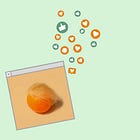Hi, hello!, and happy weekend. You have officially survived the second coming of both TikTok and the Donald Trump administration. Lol and behold, the “violent” “leftist” uprising some Trumpies foretold never came to pass; instead, the most visible anti-Trump protest of the past week played out on some midsized subreddits. When they go low, we … get high, I guess. Or when they go low, we go cooperative.
I’m just riffing here; it’s all surreal as hell and I have nothing further to say about it (!!).
Are you a journalist who writes (or wants to write) your own newsletter? I’m so psyched to be teaching a session of this phenomenal six-week workshop alongside Liz Kelly Nelson, Blair Hickman, Ryan Y. Kellett, Lynn Walsh and Lex Roman. This is the boot camp I would have *loved* to have taken before relaunching Links, full of hard-won wisdom on editorial and audience strategy, newsletter monetization and techniques for designing a fulfilling and sustainable indie business.
If you’re interested, you can find more info and testimonials from the first time we taught this workshop at the link below. There’s also a 20% discount for the first few sign-ups.
If you read anything this weekend
“How 9 Popular YouTubers Helped Trump Win a Second Term,” by Davey Alba, Leon Yin, Julia Love, Ashley Carman, Priyanjana Bengani, Rachael Dottle and Elena Mejía for Bloomberg. If that extraordinary **septuple byline** didn’t tip you off, this is the definitive analysis of the Rogansphere we’ve been waiting for. Reporters reviewed nearly 1,300 hours of podcasts and YouTube videos to map out the growing ecosystem of right-leaning podcast bros, the political vision they pitched on their channels and the role they played in delivering Trump an entire generation of disaffected male voters. If you’ve never heard these guys talk before, it’s worth clicking through the clips Bloomberg assembled just to get a sense of the tepid, slimy bath young men are incubating in.
Previously in Links: Sam Wolfson on “the Rogansphere”; Max Read on the “TikTok electorate”
See also: Wired’s new guide to MAGA influencers and Taylor Lorenz’s colorful dispatch from a TikTok party for pro-Trump creators.
“How Random, Really, Is Spotify’s Shuffle Feature?” by Heather McCalden for The Financial Times. This is so incredibly fascinating — not just on the subject of Spotify playlists, but on the mind-bendy nature of “randomness” itself. Computers, it turns out, can’t truly be random. And human brains can’t comprehend it. When an old Spotify algorithm approached truly random, listeners rebelled — they hated it.
“Signature Moves: Are We Losing the Ability to Write By Hand?” By Christine Rosen for The Guardian. This piece conflates handwriting and cursive writing throughout, which makes its author sound alarmist and crotchety. I don’t care if you can write a string of random letters without lifting your pen from the page!! But the notion that we might lose handwriting in general — that the whole universe of letters, lists and notes has migrated entirely to our keyboards and phones — does strike me as a sad and reductive thing, for both readers and writers.
“What Happens When the Internet Disappears?” By s.e. smith for The Verge. An unusually lovely personal meditation on the unlovely phenomenon of link rot, which has reduced the internet to a “series of lacunas” defined by where content once was … but is not.
There’s a phenomenon that happens where I live along the rugged coastline of Northern California, when conditions are right, or, more accurately, wrong: a layer of green, foamy scum clings to the surface of the ocean so that when the waves wash your footprints away, they are replaced by a layer of vile, reeking slime dotted by writhing marine organisms. This is, at times, how the internet feels right now. We are being slowly erased, but instead of passing peacefully into the vale with the ebb and flow of soothing waves, we are being actively replaced by garbage.
In case you missed it
The most-clicked link from last week’s newsletter was Anne Helen Petersen’s incisive essay on the disappearing incentives of regular social media use.
For the mid-week edition, I predicted what social media will look like in four years. TL;DR: not very good!!
Postscripts
Thank you to everyone who voted in last week’s Postscripts experiment. The headline crowd is beating the word salad contingent by a ratio of almost 3:2, so if you liked Links’ long-time word salad format … now is a good time to weigh in! This week, I’m playing with a third approach that sort of straddles the previous two. I’ll keep iterating on this over the next few weeks; plz use the poll to let me know what you prefer!
Gen Z is bringing malls back (Business Insider $)
The perfect cacio e pepe, according to literal physics (Popular Science)
The problem with calling everything “content” (The Etymology Nerd)
A database of things the media has called “woke” (Wokeipedia, via Web Curios)
An argument that social media has made us more childish (New York Times $)
The future of the internet is age-gated (The Atlantic $)
You’re probably about to see lots more ads in your Substack newsletters (WSJ $)
I had not previously heard of Rep. Nancy Mace, R-South Carolina, but her weirdly sexy X account is … one for the ages (Default.blog)
63% of Americans read a book last year, up from 54% in 2023; reading correlated with gender, education, wealth and political ideology (Washington Post $)
The “secret” of China’s booming social media apps is that they’re even more cravenly commercialized than their Western equivalents (Rest of World)
“Is Elon Musk a card-carrying Nazi? It doesn’t matter … Like Trump before him, he can tell everyone to eat shit, and while the media wonders if he meant it, he’s already pointing his attention and posts and cannon of obscene wealth in another direction.” (Blood in the Machine)
Paid supporters can find unlocked links from The New York Times, The Washington Post, The Wall Street Journal and The Atlantic below the paywall, as well as this week’s reading and watching recommendations.
That’s it for this week! Until the next one. Warmest virtual regards,
Caitlin
Keep reading with a 7-day free trial
Subscribe to Links I Would Gchat You If We Were Friends to keep reading this post and get 7 days of free access to the full post archives.






